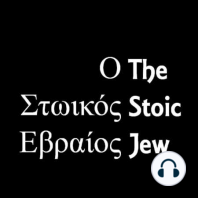3 min listen

Thank You to My Students, Be They Many or Few (Seneca: Letter #7 - On Crowds, Conclusion)
FromThe Stoic Jew
Thank You to My Students, Be They Many or Few (Seneca: Letter #7 - On Crowds, Conclusion)
FromThe Stoic Jew
ratings:
Length:
11 minutes
Released:
Mar 3, 2021
Format:
Podcast episode
Description
Synopsis: Today’s episode was unplanned. I was feeling a bit emotionally raw on Tuesday night when I recorded this (for reasons I discuss on the podcast), and I decided to express what was on my mind and just let that take the episode wherever it went.----------Seneca – Letter #7 (conclusion)In order, however, that I may not today have learned exclusively for myself, I shall share with you three excellent sayings, of the same general purport, which have come to my attention. This letter will give you one of them as payment of my debt; the other two you may accept as a contribution in advance. Democritus says: “One man means as much to me as a multitude, and a multitude only as much as one man.” The following also was nobly spoken by someone or other, for it is doubtful who the author was; when asked what was the object of all the trouble he took over a piece of craftsmanship when it would never reach more than a very few people, he replied: “A few is enough for me; so is one; and so is none.” The third saying — and a noteworthy one, too — is by Epicurus, written to one of the partners of his studies: “I write this not for the many, but for you; each of us is enough of an audience for the other.”----------Sources:- Seneca: Letter #7; click here to access the full text of Seneca's Letter - Rambam: Mishneh Torah, Sefer ha’Mada, Hilchos Talmud Torah 5:12-13 ----------If you have questions, comments, or feedback, I would love to hear from you! Please feel free to contact me at rabbischneeweiss at gmail.----------Stoic texts:The Meditations of Marcus AureliusLetters from a Stoic Master (Seneca)The Discourses of EpictetusThe Enchiridion (Handbook) of Epictetus----------Patreon: https://www.patreon.com/rabbischneeweissYouTube Channel: https://www.youtube.com/user/rabbischneeweissBlog: https://kolhaseridim.blogspot.com/Twitter: https://twitter.com/rmschneeweiss"The Mishlei Podcast": https://mishlei.buzzsprout.com"The Stoic Jew" Podcast: https://thestoicjew.buzzsprout.com"Rambam Bekius" Podcast: https://rambambekius.buzzsprout.com"Machshavah Lab" Podcast: https://machshavahlab.buzzsprout.com"The Tefilah Podcast": https://tefilah.buzzsprout.comSupport the show
Released:
Mar 3, 2021
Format:
Podcast episode
Titles in the series (100)
Intro - How NOT to Listen to This Podcast by The Stoic Jew